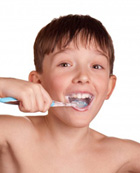 So what is your daily routine in Leeds? Get up brush your teeth, have breakfast, go to work, snack and smoke, and go for drinks after and maybe a bite, then get home and give your teeth another brush before retiring? To be fair, there’s a good chance you’re not the only one. But somewhere in that equation, you are leaving your teeth vulnerable to the attack of plaque and it’s your eating habits. Food should always be removed from the teeth by some form of brushing or flossing after you have had something to eat to ensure that no acids are allowed to form on the teeth and eat into the enamel. It’s important that you recognize this and get into a routine of proper cleaning for the future health of your teeth. By choosing the right brush and toothpaste, you give yourself a fighting chance against the evils of plaque. Shop around and try a few out first until you get the right ones because by shelling out and getting it right at this stage, you are going to save a fortune in the future on expensive corrective treatments to your teeth. Carry a brush and some floss with you, maybe even a mouth-wash so that you can keep your mouth clean throughout the day and though it sounds crazy, learn to brush your teeth properly as well. Oral hygiene should be automatic in your life, win the battle and you’ll be smiling throughout the day, lose the battle and, well, you know the rest!
So what is your daily routine in Leeds? Get up brush your teeth, have breakfast, go to work, snack and smoke, and go for drinks after and maybe a bite, then get home and give your teeth another brush before retiring? To be fair, there’s a good chance you’re not the only one. But somewhere in that equation, you are leaving your teeth vulnerable to the attack of plaque and it’s your eating habits. Food should always be removed from the teeth by some form of brushing or flossing after you have had something to eat to ensure that no acids are allowed to form on the teeth and eat into the enamel. It’s important that you recognize this and get into a routine of proper cleaning for the future health of your teeth. By choosing the right brush and toothpaste, you give yourself a fighting chance against the evils of plaque. Shop around and try a few out first until you get the right ones because by shelling out and getting it right at this stage, you are going to save a fortune in the future on expensive corrective treatments to your teeth. Carry a brush and some floss with you, maybe even a mouth-wash so that you can keep your mouth clean throughout the day and though it sounds crazy, learn to brush your teeth properly as well. Oral hygiene should be automatic in your life, win the battle and you’ll be smiling throughout the day, lose the battle and, well, you know the rest!





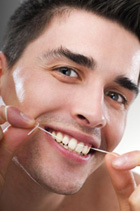 Maintaining the health of your teeth in the city of Leeds has never easier, it’s as if there’s a product for every condition in the shops these days and all you need to do is brush and floss a few times a day and that’s it; if you’re doing it correctly, you should have a trouble-free mouth. But are you doing it correctly? Flossing is designed to remove any bits of food that get stuck deep between your teeth that regular brushing can’t, but you need to get it right to achieve a good, deep clean. There’s no point in just running the thread between the teeth. You have to get it taught between your hands and run it all around the tooth and into the gums, and softly too otherwise you could break the floss or damage the gums. Doing this can take a few tries to get right, but once you get into the swing of it, you should be able to remove any bacteria from the teeth. It shouldn’t be seen just as a bolt-on to brushing either, flossing should be done after every meal aside from brushing. Some flosses come with holders and these are perfect for after meal flossing. You should try to fit it into everyday life until it becomes automatic. It can be done when you’re sitting down relaxing, even out for a walk- any time after you eaten something. Getting into this routine will help protect your teeth from all that is bad in the mouth, such as plaque and gum disease.
Maintaining the health of your teeth in the city of Leeds has never easier, it’s as if there’s a product for every condition in the shops these days and all you need to do is brush and floss a few times a day and that’s it; if you’re doing it correctly, you should have a trouble-free mouth. But are you doing it correctly? Flossing is designed to remove any bits of food that get stuck deep between your teeth that regular brushing can’t, but you need to get it right to achieve a good, deep clean. There’s no point in just running the thread between the teeth. You have to get it taught between your hands and run it all around the tooth and into the gums, and softly too otherwise you could break the floss or damage the gums. Doing this can take a few tries to get right, but once you get into the swing of it, you should be able to remove any bacteria from the teeth. It shouldn’t be seen just as a bolt-on to brushing either, flossing should be done after every meal aside from brushing. Some flosses come with holders and these are perfect for after meal flossing. You should try to fit it into everyday life until it becomes automatic. It can be done when you’re sitting down relaxing, even out for a walk- any time after you eaten something. Getting into this routine will help protect your teeth from all that is bad in the mouth, such as plaque and gum disease. Most of us in Leeds love a god chew- it can have a strangely calming affect on our stress filled day, strengthen the muscles around the jaw (if done in moderation) and the biggest bonus of all, help reduce the amount we smoke. But there are other reasons why chewing can do your teeth and gums the world of good. If you chew with a sugar free gum or these days, one that has elements of herbal products in such as clove and Echinacea, it helps to massage and stimulate the blood flow in the gums and promote the natural enemy of bacteria- saliva. Your saliva helps to strengthen teeth and neutralize the build up of acids that cause tooth decay. Chewing gum can also help to break down plaque and tartar and reduce the risk of gingivitis and gum disease. Most important of all, it helps to remove any foodstuffs from around the teeth after eating- in fact, if you chew gum during the day, you are far less likely to give into the temptation of ‘snacking’ between meals. Who’d have thought that just by chewing a piece of gum, you could promote so much health in your mouth and body?
Most of us in Leeds love a god chew- it can have a strangely calming affect on our stress filled day, strengthen the muscles around the jaw (if done in moderation) and the biggest bonus of all, help reduce the amount we smoke. But there are other reasons why chewing can do your teeth and gums the world of good. If you chew with a sugar free gum or these days, one that has elements of herbal products in such as clove and Echinacea, it helps to massage and stimulate the blood flow in the gums and promote the natural enemy of bacteria- saliva. Your saliva helps to strengthen teeth and neutralize the build up of acids that cause tooth decay. Chewing gum can also help to break down plaque and tartar and reduce the risk of gingivitis and gum disease. Most important of all, it helps to remove any foodstuffs from around the teeth after eating- in fact, if you chew gum during the day, you are far less likely to give into the temptation of ‘snacking’ between meals. Who’d have thought that just by chewing a piece of gum, you could promote so much health in your mouth and body?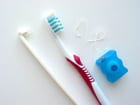 Looking after your mouth properly means that you can look forward to a future unimpeded by bothersome dental ailments. Eating, drinking, talking and smiling are easily taken for granted but if you don’t look after your mouth properly and holistically then you might find these simple activities to be compromised. Thankfully it doesn’t have to be a difficult undertaking to look after your oral hygiene, it is really just a matter of establishing routines and understanding and appreciating the potential causes of problems.
Looking after your mouth properly means that you can look forward to a future unimpeded by bothersome dental ailments. Eating, drinking, talking and smiling are easily taken for granted but if you don’t look after your mouth properly and holistically then you might find these simple activities to be compromised. Thankfully it doesn’t have to be a difficult undertaking to look after your oral hygiene, it is really just a matter of establishing routines and understanding and appreciating the potential causes of problems.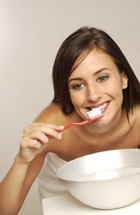 If you are in any doubt about how to get the best out of oral hygiene, then you’d better nip down to your dentist in central Leeds for a chin-wag, because to be fair, there are so many products on the market right now, what to choose can be awfully confusing. Your dentist knows as much about your mouth as you do, probably more. You should discuss the condition of your gums and teeth and the state of your mouth in general, then armed with this information, you are in a better position to make an informed decision about what products buy and how to use them. Starting with a toothbrush, it’s important to get one that suits the condition of your mouth; they come in all shapes so choose carefully. If you are just rubbish at brushing, lazy if you like, then go electric. Up next is the toothpaste. Again, tailor it to your lifestyle (do you smoke and dine richly?). Then we move into the world of ‘back-up’ products like floss, mouth washes and tiny brushes that are designed to hit areas that normal brushing misses. Of course, once you have mastered this, you should then branch out into products that you can use in a dental emergency that can strike at any time. Herbal products are excellent for this, as are everyday painkillers and of course, a telephone (to call your dentist or hospital with in a real emergency!). Follow the basics and you and your mouth should live happily ever after.
If you are in any doubt about how to get the best out of oral hygiene, then you’d better nip down to your dentist in central Leeds for a chin-wag, because to be fair, there are so many products on the market right now, what to choose can be awfully confusing. Your dentist knows as much about your mouth as you do, probably more. You should discuss the condition of your gums and teeth and the state of your mouth in general, then armed with this information, you are in a better position to make an informed decision about what products buy and how to use them. Starting with a toothbrush, it’s important to get one that suits the condition of your mouth; they come in all shapes so choose carefully. If you are just rubbish at brushing, lazy if you like, then go electric. Up next is the toothpaste. Again, tailor it to your lifestyle (do you smoke and dine richly?). Then we move into the world of ‘back-up’ products like floss, mouth washes and tiny brushes that are designed to hit areas that normal brushing misses. Of course, once you have mastered this, you should then branch out into products that you can use in a dental emergency that can strike at any time. Herbal products are excellent for this, as are everyday painkillers and of course, a telephone (to call your dentist or hospital with in a real emergency!). Follow the basics and you and your mouth should live happily ever after. Taking care of your teeth might seem like a daunting business, especially if you have suffered from poor oral hygiene in the past. But don’t be intimidated by it; following a simple set of instructions so that they become habits will help you with maintaining excellent oral hygiene for the rest of your life. Read on to find out more!
Taking care of your teeth might seem like a daunting business, especially if you have suffered from poor oral hygiene in the past. But don’t be intimidated by it; following a simple set of instructions so that they become habits will help you with maintaining excellent oral hygiene for the rest of your life. Read on to find out more!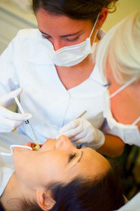 Going to the dentist for a visit every six months or so goes a long way to helping with keeping your teeth and gums healthy. Your mouth is a highly specialised collection of parts which work together to make your life easier. If any one part of it becomes diseased or loses functionality then it can threaten the smooth working of the whole thing. Your dentist is best placed to examine the whole of your mouth so that it stays healthy for you.
Going to the dentist for a visit every six months or so goes a long way to helping with keeping your teeth and gums healthy. Your mouth is a highly specialised collection of parts which work together to make your life easier. If any one part of it becomes diseased or loses functionality then it can threaten the smooth working of the whole thing. Your dentist is best placed to examine the whole of your mouth so that it stays healthy for you. You should always make time in your daily routine to take care of your teeth. First thing in the morning and last thing at night are the best times. When you sleep your mouth doesn’t produce much saliva so plaque and bacteria can thrive there. Most people brush their teeth as a matter of course but too many people don’t get around to flossing as well. If you are one of those people then you should consider how you might be endangering the good health of your teeth.
You should always make time in your daily routine to take care of your teeth. First thing in the morning and last thing at night are the best times. When you sleep your mouth doesn’t produce much saliva so plaque and bacteria can thrive there. Most people brush their teeth as a matter of course but too many people don’t get around to flossing as well. If you are one of those people then you should consider how you might be endangering the good health of your teeth. Good oral hygiene mean having teeth and gums which are in excellent health and have perfect functionality, allowing you to eat, drink and talk in comfort. There are several facets to this, including how you take care of them at home, your lifestyle and regular visits to your local dentist so that your mouth can be monitored by an expert.
Good oral hygiene mean having teeth and gums which are in excellent health and have perfect functionality, allowing you to eat, drink and talk in comfort. There are several facets to this, including how you take care of them at home, your lifestyle and regular visits to your local dentist so that your mouth can be monitored by an expert.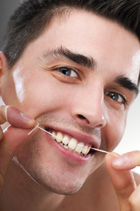 We all know how important it is to brush our teeth but how many of us neglect to floss? The fact is that flossing is a vital part of keeping your mouth nice and healthy and ought to form part of your routine. Not doing so is just helping plaque to keep a hold in your mouth and put you at risk of dental decay and other oral conditions.
We all know how important it is to brush our teeth but how many of us neglect to floss? The fact is that flossing is a vital part of keeping your mouth nice and healthy and ought to form part of your routine. Not doing so is just helping plaque to keep a hold in your mouth and put you at risk of dental decay and other oral conditions.

